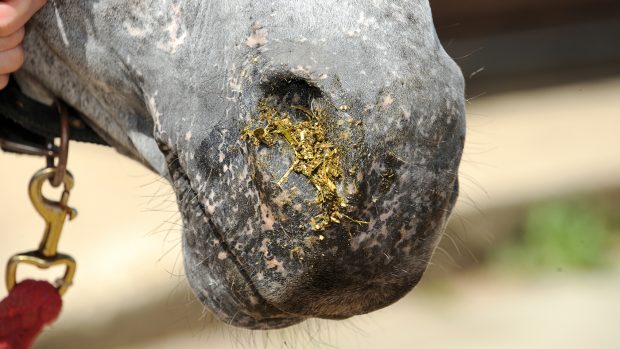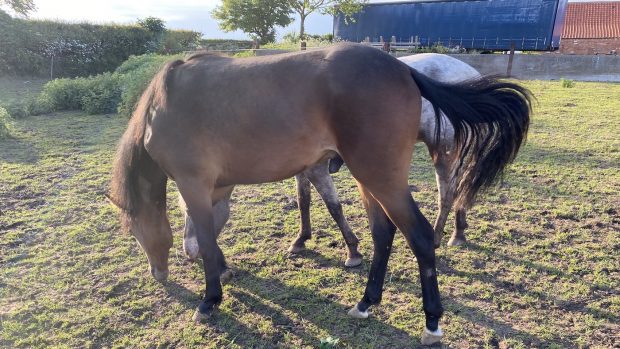Choke, a term for oesophageal impaction, is an obstruction of the food pipe by a solid mass of food or a foreign object. In a recent American survey, 60% of respondents said that a horse in their care had suffered an attack at some point, and if it has happened once, it can reoccur. Some horses are predisposed to choke, having a natural stricture of the oesophagus.
With feed-related choke, food will not have been chewed into fine enough particles before being swallowed and there is not enough saliva to lubricate its passage down the gullet.
The most common sign is the horse has difficulty in swallowing, sometimes with retching movements, both accompanied by signs of some distress and drooling. If this is prolonged, there might be regurgitation of feed or saliva through the nostrils. It is often possible to see a lump in the neck where the blockage lies.
In foals, choke may be the result of immaturity, disease, or, in rare cases, a congenital deformity. In young stock, erupting teeth may mean that feed is not masticated properly and this can predispose a horse to choke.
In all horses, choke can be brought about by poor teeth, lack of water and improper chewing of the feed. With greedy horses, those competing for feed, or worriers that grab a mouthful from the back of the stable and then rush to look out of the door, it is easy to see how feed might not be chewed properly. This applies equally to cubes, mixes, really sticky molassed chaffs and bedding.
All but the most easily moved obstructions require veterinary assistance, not least to ascertain the level of damage to the oesophagus or whether some of the feed has entered the lungs.
If the damage is slight, soft soaked feeds (hay and hard feed), and a pick of grass will help — continuing to offer feed minimises digestive disturbances and keeps saliva flowing. This is important because saliva contains chemicals that aid repair of any damaged tissue.
Avoiding choke
- Prevent choke by checking teeth regularly and giving hard feeds on the floor
- Mix the feed with a lightly coated chaff to slow down eating and encourage mastication, or slow eating time by putting large stones in the manger
- If soaking feed, allow adequate time and ensure that all sugar beet nuts and pellets are broken down.
- Let a horse eat in peace. Avoid commotion that may cause him to move from the manger to the door rapidly, or use a manger that hangs over the door for nosy horses
- This “Feed Forum” feature was first published in Horse & Hound (24 February, ’05)

 Get up to 19 issues FREE
Get up to 19 issues FREE
 UK’s No1 weekly for Horses for Sale
UK’s No1 weekly for Horses for Sale
 Latest results and reports
Latest results and reports
 TO SUBSCRIBE CLICK HERE
TO SUBSCRIBE CLICK HERE





